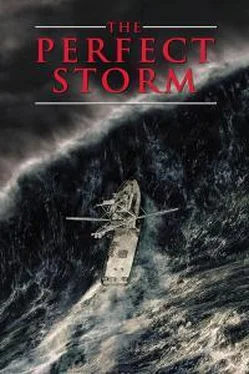Sebastian Junger - The Perfect Storm
Здесь есть возможность читать онлайн «Sebastian Junger - The Perfect Storm» — ознакомительный отрывок электронной книги совершенно бесплатно, а после прочтения отрывка купить полную версию. В некоторых случаях можно слушать аудио, скачать через торрент в формате fb2 и присутствует краткое содержание. Жанр: Триллер, Проза. Описание произведения, (предисловие) а так же отзывы посетителей доступны на портале библиотеки ЛибКат.
- Название:The Perfect Storm
- Автор:
- Жанр:
- Год:неизвестен
- ISBN:нет данных
- Рейтинг книги:3 / 5. Голосов: 1
-
Избранное:Добавить в избранное
- Отзывы:
-
Ваша оценка:
- 60
- 1
- 2
- 3
- 4
- 5
The Perfect Storm: краткое содержание, описание и аннотация
Предлагаем к чтению аннотацию, описание, краткое содержание или предисловие (зависит от того, что написал сам автор книги «The Perfect Storm»). Если вы не нашли необходимую информацию о книге — напишите в комментариях, мы постараемся отыскать её.
The Perfect Storm — читать онлайн ознакомительный отрывок
Ниже представлен текст книги, разбитый по страницам. Система сохранения места последней прочитанной страницы, позволяет с удобством читать онлайн бесплатно книгу «The Perfect Storm», без необходимости каждый раз заново искать на чём Вы остановились. Поставьте закладку, и сможете в любой момент перейти на страницу, на которой закончили чтение.
Интервал:
Закладка:
By and large it's a bar of people who know each other; people who aren't known are invited over for a drink. It's hard to buy your own beer at the Crow's Nest, and it's hard to leave after just one; if you're there at all, you're there until closing. There are few fights at the Nest because everyone knows each other so well, but other waterfront bars—Pratty's, Mitch's, the Irish Mariner—are known to disassemble themselves on a regular basis.
Ethel worked at one place where the owner started so many brawls that she refused to serve him in his own place; the fact that he was a state trooper didn't help matters much. John, another bartender at the Nest, recalls a wedding where the bride and groom got into an argument and the groom stormed off, dutifully followed by all the men in the party. Of course they went to the nearest bar and eventually one of them pitched a sarcastic comment to a quiet, stocky guy sitting off by himself. The man got up, took his hat off and walked down the bar, knocking out the entire male half of the wedding party, one by one.
The closest it's ever come to that at the Nest was one night when there was an ugly cluster of rednecks at one end of the room and a handful of black truckers at the other. The truckers were regulars at the Nest, but the rednecks were from out of town, as were a hopped-up bunch of swordfishermen who were talking loudly around the pool table. The focus of attention of this edgy mix was a black kid and a white kid who were playing pool and arguing, apparently over a drug deal. As the tension in the room climbed, one of the truckers called John over and said, Hey, don't worry, both those kids are trash and we'll back you up no matter what.
John thanked him and went back to washing glasses. The swordfishermen had just gotten off a trip and were reeling drunk, the rednecks were making barely-muted comments about the clientele, and John was just waiting for the cork to pop. Finally one of the rednecks called him over and jutted his chin across the bar at the black truckers.
Too bad you gotta serve 'em but I guess it's the law, he said.
John considered this for a moment and then said, Yeah, and not only that, they're all friends of mine.
He walked across to the pool table and threw the kids out and then he turned to the swordfishermen and told them that if they wanted trouble, they would certainly find plenty. John's friends were particularly large examples of humankind and the swordfishermen signalled that they understood. The rednecks finally left, and by the end of the night it was back to the same old place it had always been.
"It's a pretty good crowd," says Ethel. "Sometimes you get the wild scallopers in but mostly it's just friends. One of the best times I ever had here was when this Irishman walked in and ordered fifty beers. It was a dead Sunday afternoon and I just looked at him. He said that his friends would be along in a minute, and sure enough, an entire Irish soccer team came in. They'd been staying in Rockport, which is a dry town, and so they just started walking. They walked all the way down Route 127, five miles, and this was the first place they came to. They were drinking beer so fast we were selling it right out of the cases. They were doing three-part harmonies on the tabletops."
EARLY fishing in Gloucester was the roughest sort of business, and one of the deadliest. As early as the 1650s, three-man crews were venturing up the coast for a week at a time in small open boats that had stones for ballast and unstayed masts. In a big wind the masts sometimes blew down. The men wore canvas hats coated with tar, leather aprons, and cowhide boots known as "redjacks." The eating was spare: for a week-long trip one Gloucester skipper recorded that he shipped four pounds of flour, five pounds of pork fat, seven pounds of sea biscuit, and "a little New England rum." The meals, such as they were, were eaten in the weather because there was no belowdeck where the crews could take shelter. They had to take whatever God threw at them.
The first Gloucester fishing vessels worthy of the name were the thirty-foot chebaccos. They boasted two masts stepped well forward, a sharp stern, and cabins fore and aft. The bow rode the seas well, and the high stern kept out a following sea. Into the fo'c'sle were squeezed a couple of bunks and a brick fireplace where they smoked trashfish. That was for the crew to eat while at sea, cod being too valuable to waste on them. Each spring the chebaccos were scraped and caulked and tarred and sent out to the fishing grounds.
Once there, the boats were anchored, and the men handlined over the side from the low midship rail. Each man had his spot, called a "berth," which was chosen by lottery and held throughout the trip. They fished two lines at twenty-five to sixty fathoms (150-360 feet) with a ten-pound lead weight, which they hauled up dozens of times a day. The shoulder muscles that resulted from a lifetime of such work made fishermen easily recognizable on the street. They were called "hand-liners" and people got out of their way.
The captain fished his own lines, like everyone else, and pay was reckoned by how much fish each man caught. The tongues were cut out of the fish and kept in separate buckets; at the end of the day the skipper entered the numbers in a log book and dumped the tongues overboard. It took a couple of months for the ships to fill their holds—the fish was either dried or, later, kept on ice—and then they'd head back to port. Some captains, on a run of fish, couldn't help themselves from loading their ship down until her decks were almost underwater. This was called deep-loading, and such a ship was in extreme peril if the weather turned ugly. The trip home took a couple of weeks, and the fish would compress under its own weight and squeeze all the excess fluid out of the flesh. The crew pumped the water over the sides, and deep-loaded Grand Bankers would gradually emerge from the sea as they sailed for port.
By the 1760s Gloucester had seventy-five fishing schooners in the water, about one-sixth of the New England fleet. Cod was so important to the economy that in 1784 a wooden effigy—the "Sacred Cod"—was hung in the Massachusetts State House by a wealthy statesman named John Rowe. Revenue from the New England codfishery alone was worth over a million dollars a year at the time of the Revolution, and John Adams refused to sign the Treaty of Paris until the British granted American fishing rights to the Grand Banks. The final agreement held that American schooners could fish in Canada's territorial waters unhindered and come ashore on deserted parts of Nova Scotia and Labrador to salt-dry their catch.
Cod was divided into three categories. The best, known as "dun fish," was caught in the spring and shipped to Portugal and Spain, where it fetched the highest prices. (Lisbon restaurants still offer bacalao, dried codfish.) The next grade of fish was sold domestically, and the worst grade—"refuse fish"—was used to feed slaves in the West Indian canefields. Gloucester merchants left for the Caribbean with holds full of salt cod and returned with rum, molasses, and cane sugar; when this lucrative trade was impeded by the British during the War of 1812, local captains simply left port on moonless nights and sailed smaller boats. Georges Bank opened up in the 1830s, the first railway spur reached Gloucester in 1848, and the first ice companies were established that same year. By the 1880s—the heyday of the fishing schooner—Gloucester had a fleet of four or five hundred sail in her harbor. It was said you could walk clear across to Rocky Neck without getting your feet wet.
Cod was a blessing but could not, alone, have accounted for such riches. In 1816, a Cape Ann fisherman named Abraham Lurvey invented the mackerel jig by attaching a steel hook to a drop-shaped piece of cast lead. Not only did the lead act as a sinker, but, jiggled up and down, it became irresistible to mackerel. After two centuries of watching these elusive fish swim past in schools so dense they discolored the sea, New England fishermen suddenly had a way to catch them. Gloucester captains ignored a federal bounty on cod and sailed for Sable Island with men in the crosstrees looking for the telltale darkening of mackerel in the water. "School-O!" they would shout, the ship would come around into the wind, and ground-up baitfish—"chum"—would be thrown out into the water. The riper the chum was, the better it attracted the fish; rotting chum on the breeze meant a mackerel schooner was somewhere upwind.
Читать дальшеИнтервал:
Закладка:
Похожие книги на «The Perfect Storm»
Представляем Вашему вниманию похожие книги на «The Perfect Storm» списком для выбора. Мы отобрали схожую по названию и смыслу литературу в надежде предоставить читателям больше вариантов отыскать новые, интересные, ещё непрочитанные произведения.
Обсуждение, отзывы о книге «The Perfect Storm» и просто собственные мнения читателей. Оставьте ваши комментарии, напишите, что Вы думаете о произведении, его смысле или главных героях. Укажите что конкретно понравилось, а что нет, и почему Вы так считаете.












